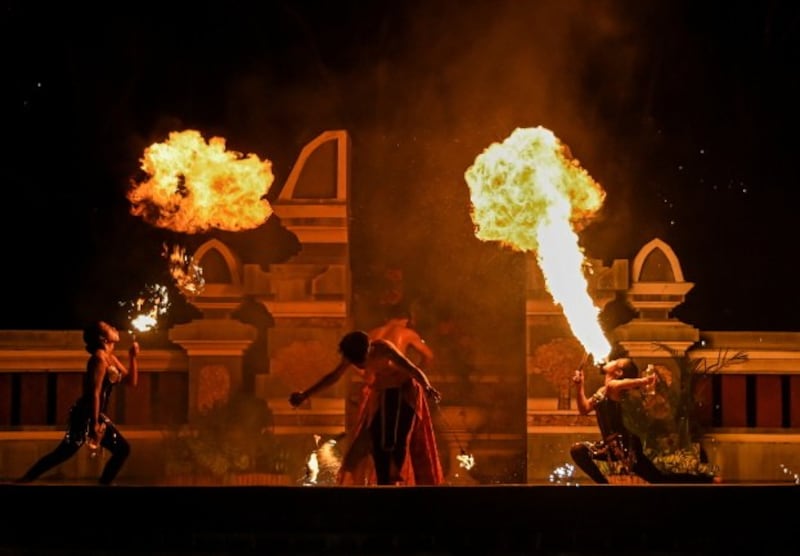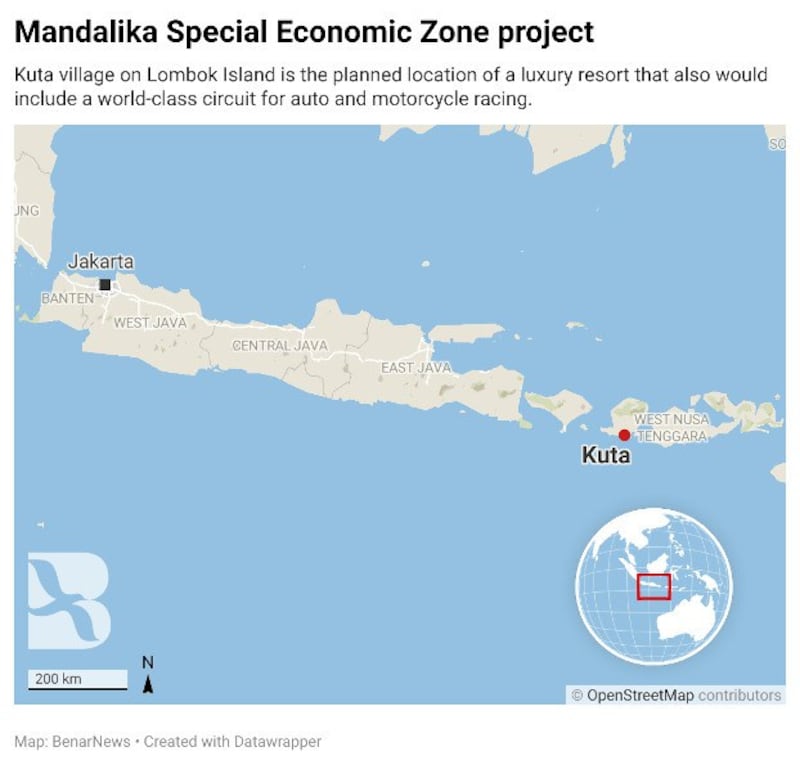Some residents of an Indonesian island where a world-class luxury resort and motor-racing circuit is being constructed with China-linked money say they have been threatened in connection with the project or have not received fair compensation for their land.
The Mandalika Special Economic Zone, a multi-billion-dollar project on Lombok Island, is part of an ambitious program introduced by President Joko “Jokowi” Widodo in 2016 to create “10 new Balis,” in a bid by his government to attract many more tourists to the archipelago-nation.
The site of the Lombok project, partly funded by the China-based Asian Infrastructure Investment Bank (AIIB), is scheduled to host a MotoGP motorcycle street race next year.
Sibawai, one of dozens of Kuta village residents in Central Lombok regency who have refused to give up their properties, said the state-owned Indonesia Tourism Development Corp. (ITDC), had not compensated him for the portion of his land cleared to make way for the project.
“I have been subjected to intimidation,” Sibawai told BenarNews, an RFA-affiliated online news service. “I have tried to stop the heavy equipment, but with so many security personnel there’s nothing I can do. But I refuse to leave.”
Sibawai, as is common with many Indonesians, goes by one name.
Hundreds of police, soldiers, and the local government’s security personnel have blocked the road leading to his neighborhood, now an enclave within the 2,471-acre Mandalika resort being developed by ITDC, under the pretext of COVID-19 prevention, he said in a phone interview.
“But their intention is to stop people from helping us,” he said. “They barged into my house looking for me as if I was a terrorist and causing trauma to my family.”
Sibawai said he and others who did not leave do not have access to clean drinking water.
“The nearby canal has been pumped around the clock, causing the water to turn salty,” he said.
Another resident, Damar, said he was compensated for only 3,300 square meters of his 5,600 square-meter property.
“We have the support of the regency’s chief who believes that we should be compensated if we haven’t been compensated, but there’s no word from ITDC,” he said.
He said the developer put up a fence around the neighborhood, allowing only a narrow road for access.
In response, ITDC spokeswoman Miranti Rendranti said the tourism agency had spent 114.5 billion rupiah (U.S. $7.9 million) for land compensation.
“The residents who remain in the enclave hope to receive compensation more than what has been decided by the court based on independent appraisals,” she told BenarNews.
“This is not legally possible because the court’s decision is final,” she said. “Still, ITDC is adopting a persuasive approach so the residents who live in the enclave can accept the court’s decision.”
Miranti said the developer hoped to complete the entire U.S. $3 billion (43.4 trillion rupiah) Mandalika project, which includes new roads, a lagoon, a five-star hotel, and a 4,000-person capacity mosque by 2026.
The new street circuit is expected to host the MotoGP motorcycle racing world championship in 2022 – the second MotoGP event in Indonesia since 1997, officials said. In the future, the officials said they also wanted to bring Formula 1 auto racing to Mandalika.

UN concerns
The development project, however, has drawn concerns from the United Nations.
In April, U.N. human rights experts issued a statement urging the Indonesian government to respect the rights of those affected by the Mandalika project, noting that locals had been the victims of land grabs, forced evictions, and intimidation.
“Farmers and fisher folks have been expelled from their land and have endured the destruction of their houses, fields, water sources, cultural and religious sites, as the government of Indonesia and the ITDC groomed Mandalika to become a ‘New Bali,’” said Olivier De Schutter, the U.N. special rapporteur on extreme poverty and human rights.
“Credible sources have found that the local residents were subjected to threats and intimidations and forcibly evicted from their land without compensation,” the statement said.
The Indonesian government rejected the allegations as “false,” calling the U.N. statement “hyperbolic.”
“The news release has unfortunately misrepresented cases of legal disputes related to the sale of land,” the Ministry of Foreign Affairs said in a statement.
Indonesia believes that sustainable development goals “can only be achieved by advancing the pillars of economic growth, social development and environmental protection in a balanced manner,” the ministry said.

Meanwhile, some advocates point to gaps in AIIB’s environmental and social framework system as partly to blame for the human rights violations – and fear that similar abuses could take place in other Southeast Asian countries including Myanmar where AIIB is active.
“The AIIB has been found to approve projects in Southeast Asia in manners that are exceptionally opaque,” said Wawa Wang, a senior adviser at VedvarendeEnergi, who has been working with residents in Lombok. VedvarendeEnergi is a Danish non-profit organization that advocates environmentally sustainable development.
AIIB has funded projects through countries that have minimum standards, which could lead to defaults instead of using countries that have more strict standards, Wang said.
“This is unacceptable,” she said.
Wang said warning signs appeared as early as the project’s implementation.
“AIIB has both through its policies and management rejected committing to the full disclosure of environmental and social due diligence assessments prior to approving a high-risk project such as the Mandalika tourism project,” Wang said.
Joining AIIB in funding the project is France-based VINCI Construction Grands Projets group, De Schutter said, adding they must not look the other way in the face of allegations of abuse.
“Their failure to prevent and address risks of human rights abuses is tantamount to being complicit in such abuses,” he said.
Meanwhile, residents living within the tourism project area, including a fishing community and a village art market allege there have been at least five forced evictions carried out since 2019.
“We ask the AIIB president to visit the Mandalika and have a direct dialogue with the victims of eviction at the AIIB project site,” said a Lombok-based activist working with local community members, who asked to not be named over fear of reprisal.
“Stop financing the project because it has impoverished and added to the burden and suffering of [community members] in Central Lombok,” the activist told BenarNews.
AIIB said it takes allegations of rights violations seriously, adding it sent an experienced social development consultant to visit Lombok and has since set up an action plan.
The plan includes “increasing the frequency of stakeholder engagement with a wider range of interested parties, a process to resolve disputed land acquisition and setting up procedures for when the use of security forces may be warranted,” an AIIB spokesman told BenarNews in June.
The Beijing-based AIIB was founded in 2016 as an alternative to established multilateral lending banks, such as the World Bank and Asian Development Bank. Beijing controls about 26 percent of voting shares, giving China clear influence in how the bank operates.
Reported by BenarNews, an RFA-affiliated online news service.
